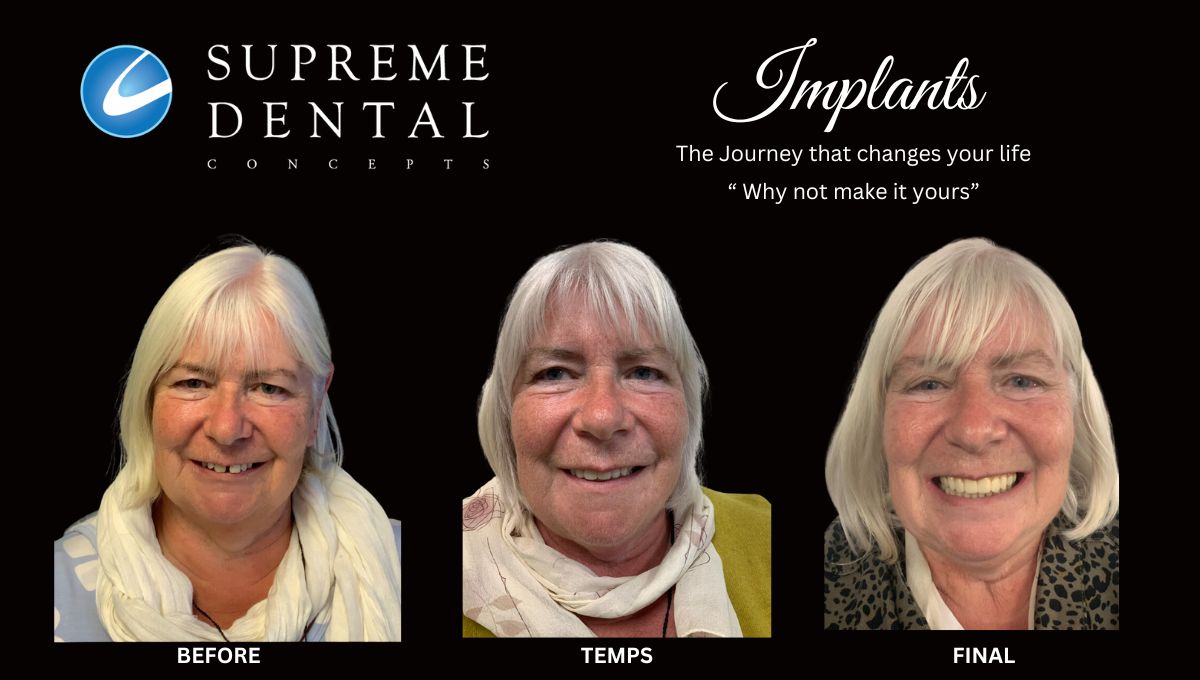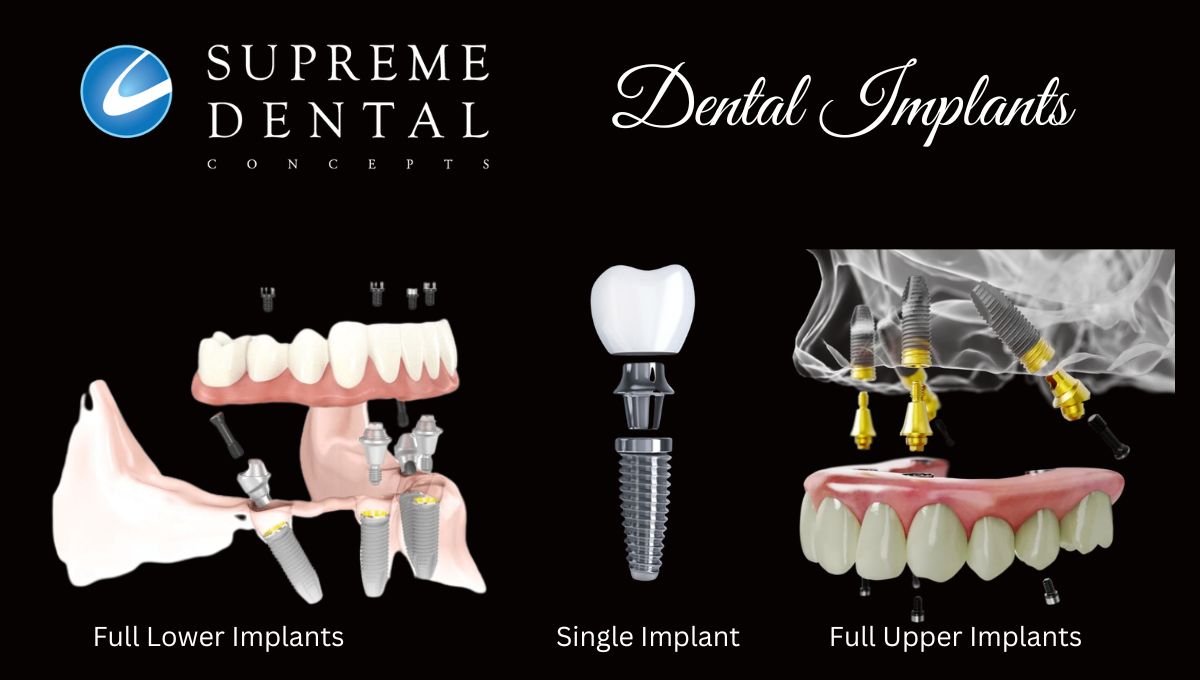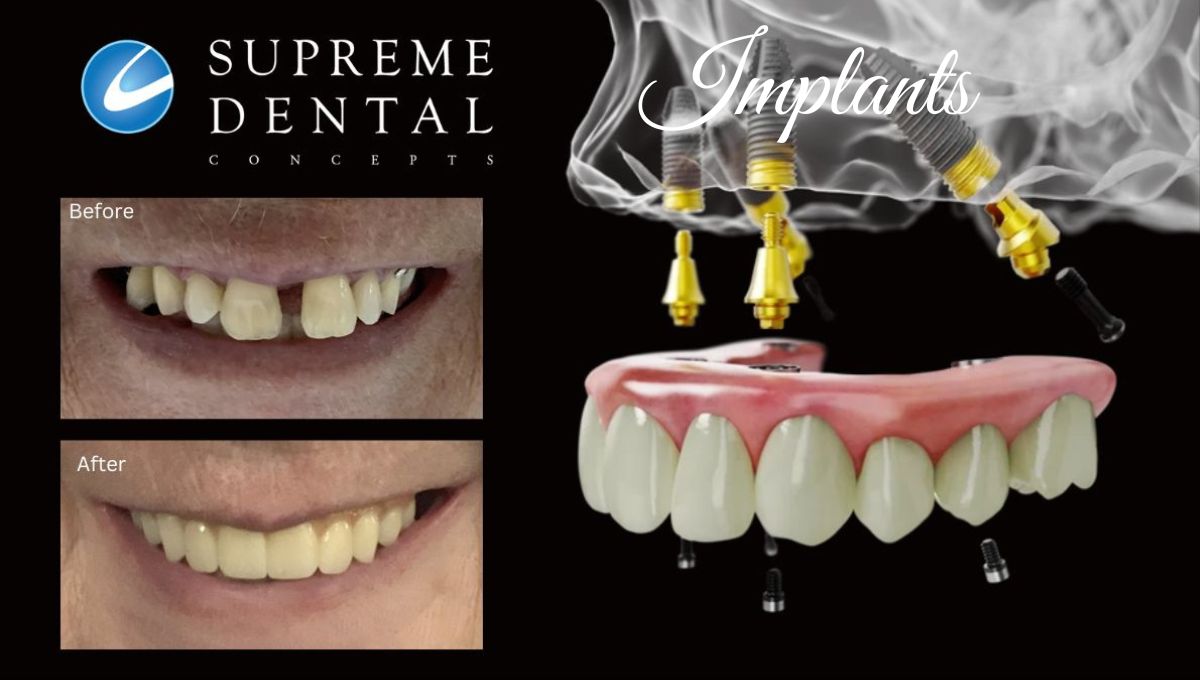Wellington:
(04) 801 6228
Lower Hutt:
(04) 570 0520

Because implanted teeth are fixed in the mouth—rather than being removable, like dentures—they allow a return to much of the comfort & function of natural teeth. Increased chewing ability means you can enjoy more nutritious foods, contributing to your overall health & wellbeing. Dental implants can help prevent future dental problems, especially the gradual bone loss in the jaw associated with missing teeth.
The biggest advantage implants have over dentures is that they’re permanent. Unlike removable dentures or partial dentures, implants do not involve messy adhesives or false teeth getting in the way of speech or eating. Also, because they’re permanent, implants will always be a perfect fit, unlike dentures which may need to be refitted or replaced over time.
Dental implants are man-made replacements for natural teeth. The implants themselves are artificial tooth roots made from titanium & are anchored in the gum & jawbone. The implant’s screw-like shape helps it stay in place by providing more surface area for your bone to grow into, a process called osseointegration. Replacement teeth, referred to as crowns, are then permanently secured to these metal implants. They can improve your appearance, boost your self-confidence & allow you to speak with greater clarity than you would with missing teeth or ill-fitting dentures.
Initial Consultation:
Pre-operative Preparation:
Implant Placement:
Healing Period:
Abutment Placement:
Final Restoration:
Throughout the entire process, the dental team works closely with the patient to address any concerns and ensure a successful outcome.
The Digital Smile Design (DSD) protocol revolutionizes the dental implant journey by incorporating advanced digital technologies to enhance treatment planning, communication, and patient satisfaction. Here's how the dental implant journey unfolds with DSD protocols:
Initial Consultation and Smile Analysis:
Digital Smile Design (DSD):
Implant Planning and Simulation:
Guided Surgery:
Implant Placement:
Final Restoration:
Follow-Up and Maintenance:
By integrating DSD protocols into the dental implant journey, patients can enjoy a streamlined process, personalized treatment, and beautiful, natural-looking results that enhance their overall facial aesthetics and quality of life.
Dental implants have a wide range of applications in modern dentistry. Here's a list of some of the primary applications:
These applications demonstrate the versatility and effectiveness of dental implants in restoring oral function, aesthetics, and overall quality of life for patients with missing teeth or dental issues.
The cost of dental implants can vary widely depending on several factors, including the number of implants needed, the complexity of the case, the location of the dental practice, and any additional procedures required (such as bone grafting or sinus lifts). Here's a list of average costs for dental implants in New Zealand dollars (NZD):
Single Tooth Implant:
Implant-Supported Bridge (3-4 teeth):
Full Arch Implant-Supported Dentures (All-on-4 or All-on-6):
Implant Overdentures (Snap-in Dentures):
Sinus Lift or Bone Grafting (if needed):
Implant Crown or Abutment Replacement:
Implant Removal and Replacement:
Implant-Supported Prosthesis for Facial Reconstruction:
It's important to note that these are average cost ranges, and actual prices may vary based on individual circumstances and the specific treatment plan recommended by the dentist. Additionally, the cost may or may not include preliminary consultations, diagnostic imaging, anesthesia, post-operative care, and follow-up appointments.
Patients should consult with their dentist or oral surgeon to receive an accurate estimate based on their unique needs and treatment goals. Some dental practices may also offer financing options or payment plans to help make dental implant treatment more affordable for patients

"What can I say except thank you all for making me smile again!
It took a while and I had to learn...
It was not an easy decision to get my "remaining" teeth removed even though I had pain in my mouth most of the time.
If I had been aware how much difference going down the full mouth implant process would make to me on a daily basis.. I would not have wasted time and money on partial dentures and individual tooth extractions.
My food tastes how it should and because l couldn't chew with dentures I had to restrict what I ate.
Navin was patient, kind and most of all caring.
The team that works with Navin are so lovely I can't thank you all enough."


Those who may not be eligible for standard implants due to bone loss may be eligible for mini implants. Mini implants are smaller than standard implants so they don’t need as much space in the bone to be installed. Mini implants are used to secure an advanced kind of dentures or partial dentures. These dentures are much more secure than standard dentures because they clip on to the mini implants instead of being attached by adhesives. Patients who have implant-supported dentures are often able to eat many foods that they might not have been able to with standard dentures.
Mini dental implants can also be a slightly more affordable option for whole-mouth restoration than a full set of standard dental implants. You will need to have a consultation with the dentist in order to determine if mini implants are a good option for you.
Not all patients are eligible for dental implants. Generally, you must be in good general & oral health to be a candidate for implants. Those who are undergoing cancer treatment, have uncontrolled diabetes or uncontrolled periodontal (gum) disease, may not be eligible for dental implants. These conditions can affect whether the dental implant can be properly secured into the bone of your jaw, & can also affect post-operative outcomes. In creating your dental implant treatment plan, the dentist will assess all of the relevant health factors & advise you accordingly.
Supreme Dental Concepts works in conjunction with multiple teams to ensure we achieve the best outcome for our clients. We arrange what is best for you.
Our commitment is to you the client and what you would like to achieve at the end of the process
At Supreme Dental Concepts, we provide a comprehensive selection of cosmetic dentistry services designed to give you the confident smile you desire.
Our commitment extends to ensuring you look your absolute best.
As dentists, our training in injection techniques and facial anatomy during dental school equips us to preserve your youthful appearance, complementing your beautiful teeth.
